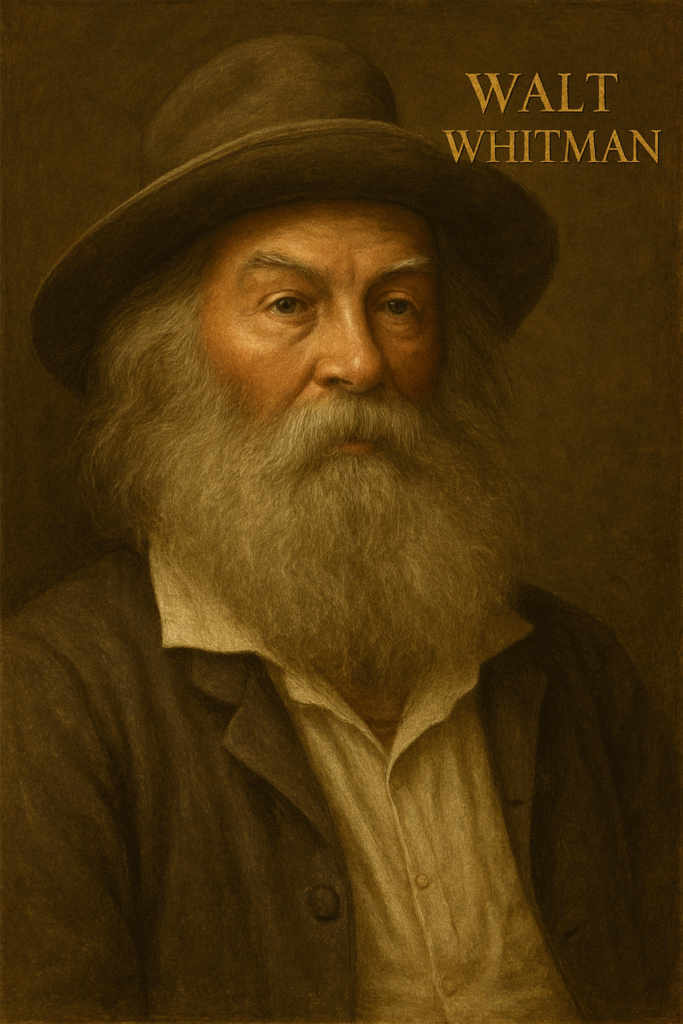Walt Whitman: Voice of American Democracy
Walt Whitman, the voice of American democracy, changed the direction of American poetry. He embraced freedom, individuality, and equality. Born in 1819, Whitman grew up in New York and worked as a printer, journalist, and teacher. His varied jobs gave him exposure to everyday people, which shaped his poetic voice. Unlike traditional poets, Whitman wrote in free verse and used ordinary language. He focused on the beauty of the human body, the soul, and the collective American spirit.

Whitman published his groundbreaking work, Leaves of Grass, in 1855. Importantly, he paid for the publication himself. Although the book broke poetic conventions and shocked critics, it introduced a bold new voice. In fact, the voice of American democracy rang clear in its pages. Over the years, Whitman revised and expanded the collection. Each edition included new poems that reflected changing times. Moreover, the Civil War deeply influenced his later works. During that period, he served as a volunteer nurse, which exposed him to the pain of soldiers. As a result, his poems from this period carry a deep sense of compassion and sorrow.
Consequently, the voice of American democracy echoed in every line Whitman wrote. He celebrated the individual; however, he also emphasized unity. In poems like “Song of Myself,” he used the first-person voice to represent all Americans. Additionally, he blurred the line between the personal and the political. This approach allowed readers to see themselves in his words. Furthermore, Whitman’s inclusive tone welcomed all races, genders, and classes. Clearly, he believed poetry should reflect the diverse American experience.
While some critics dismissed his style as vulgar or chaotic, others praised his innovation. Eventually, the literary world recognized his genius. As a result, schools and scholars embraced his work. The voice of American democracy continued to inspire new generations. Notably, writers like Langston Hughes and Allen Ginsberg saw Whitman as a guiding force. His influence even reached political speeches and social movements. In fact, many leaders quoted his lines to promote justice and equality.
Notably, Whitman’s poetry remains relevant today. It speaks to readers in moments of hope and struggle. Because of his unique style, readers often feel personally addressed. His use of repetition, cataloging, and direct address created a bond between poet and reader. The voice of American democracy never faded. Instead, it grew louder as Whitman’s legacy expanded.
Whitman also believed in the physical and spiritual unity of people. He often connected nature to the human soul. His imagery pulled from rivers, grass, stars, and streets. These natural and urban images brought a full picture of America. Through his vivid language, Whitman painted a landscape filled with strength and possibility. Even his long lines reflected his belief in abundance and freedom.
Besides his poetry, Whitman wrote essays and prose. In these writings, he defended his artistic choices. He also shared his thoughts on literature, politics, and society. The voice of American democracy guided all his work. He championed democracy not just as a system of government but as a way of life. For Whitman, true democracy involved recognizing every person’s worth.
During his lifetime, Whitman faced both praise and criticism. Some hailed him as a prophet; others saw him as a radical. Yet, he never wavered from his mission. He believed poetry could shape a nation. And in many ways, it did. The voice of American democracy changed literary history and national identity.
After his death in 1892, Whitman’s reputation continued to grow. Libraries, schools, and museums honored him. His birthplace became a historic site. Readers around the world studied his poems. Today, the voice of American democracy still echoes through his lines. He remains a central figure in American literature.
Whitman’s belief in progress, unity, and human dignity made him timeless. He welcomed every reader, regardless of background. Through his poetry, he invited people to find themselves and their nation. His message of love, freedom, and democracy still feels urgent. The voice of American democracy endures through his vision.
The Parson in The General Prologue: https://englishlitnotes.com/2025/05/29/parson-in-the-general-prologue/
Herman Melville: https://americanlit.englishlitnotes.com/herman-melville/
The Use of “Pointlessness”: https://grammarpuzzlesolved.englishlitnotes.com/example-sentence-using-pointlessness/
The Jewel of the World: https://englishwithnaeemullahbutt.com/2025/06/03/jewel-of-the-world/
Discover more from Welcome to My Site of American Literature
Subscribe to get the latest posts sent to your email.
